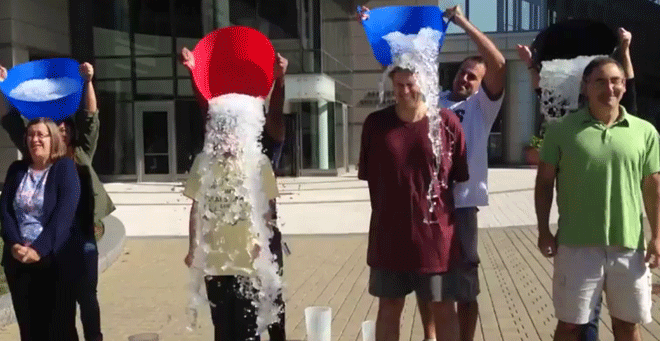
taking the Ice Bucket Challenge |
It’s been five years since the Ice Bucket Challenge fundraiser for the ALS Association went viral and raised millions of dollars for amyotrophic lateral sclerosis research. This week, hundreds of people around the world, including John Landers, PhD, professor of neurology, celebrated the anniversary and the advancements in research toward a cure for ALS.
“We know so much more now than we did five and 10 years ago,” Dr. Landers told reporter Abbey Niezgoda of NBC 10 Boston prior to joining ALS Association officials, family and community advocates, researchers, and local celebrities in an anniversary dumping of ice-cold water over his head.
ALS is a progressive neurodegenerative disease that affects the motor neurons that control muscle cells. People with ALS slowly lose the ability to initiate and control muscle movement, gradually losing function, causing muscles to become weak and eventually nonfunctional. Most cases of ALS are sporadic, meaning there is no known family history of the disease. However, up to 10 percent of cases are familial, meaning the disease is inherited or passed down within a family. Life expectancy is typically three to five years after diagnosis, and there is no cure.
Scientists have identified more than 40 genes that cause familial ALS; some of them have also been found in nonfamilial ALS patients. At UMMS, Landers coordinated a team of international researchers, who have discovered two of those genes.
In 2016, an international research team led by Landers and Jan Veldink, PhD, at University Medical Center Utrecht in the Netherlands, and supported with $1 million in funding the ALS Association from the Ice Bucket Challenge, found variations in NEK1, a gene with multiple functions in neurons, present in approximately 3 percent of all cases of both sporadic and familial ALS in North America and Europe, making it one of the most common genetic causes of the disease. The findings were published in Nature Genetics that July and marked the two-year anniversary of the Ice Bucket Challenge, in which many members of the UMMS and UMass Memorial Health Care community participated.
In 2018, an international team of researchers led by Landers and Bryan Traynor, MD, PhD, at the National Institute on Aging at the National Institutes of Health, identified KIF5A as a new gene associated with the development of ALS. The discovery, published in the journal Neuron, advanced the understanding of what causes ALS and further implicated the role of cytoskeletal defects in the axon as a common factor in the disease. It pointed to the cytoskeleton as a potential target for new drug development.
See the full NBC 10 Boston story here: www.nbcboston.com/multimedia/Ice-Bucket-Challenge-Turns-5-at-Copley-Square_NECN-512753592.html
Related stories on UMassMedNow:
UMass Med Now Discovery of new ALS gene points to common role of cytoskeleton in disease
UMMS-led discovery of ALS gene funded by Ice Bucket Challenge; nets global attention
New gene variants present in 3 percent of all ALS patients